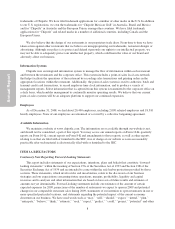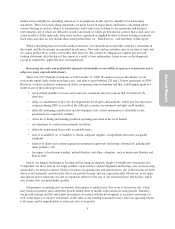Chipotle 2008 Annual Report Download - page 20
Download and view the complete annual report
Please find page 20 of the 2008 Chipotle annual report below. You can navigate through the pages in the report by either clicking on the pages listed below, or by using the keyword search tool below to find specific information within the annual report.
As a result of these factors, results for any one quarter are not necessarily indicative of results to be expected
for any other quarter or for any year. Average restaurant sales or comparable restaurant sales in any particular
future period may decrease. In the future, operating results may fall below the expectations of securities analysts
and investors, which could cause our stock prices to fall. We believe the market prices of our class A and class B
common stock reflect high market expectations for our future operating results, and as a result , if we fail to meet
market expectations for our operating results in the future, any resulting decline in the price of our common stock
could be significant.
The prices of our class A and class B common stock may continue to differ.
Our class B common stock has historically traded at lower prices than our class A common stock. For
instance, on February 13, 2009, our class A common stock closed at $55.05 per share and our class B common
stock closed at $51.17 per share. The trading prices of our class A and class B common stock may continue to
differ due to factors outside of our control, including differences in market awareness of the two classes, trading
liquidity of the two classes or other factors. In the separation agreement we entered into with McDonald’s in
connection with our separation from them, we agreed not to take any action to combine the class A and class B
common stock or otherwise eliminate the two-class capital structure until at least the fifth anniversary of the
separation, unless we obtain McDonald’s consent, or McDonald’s (at our request) obtains a ruling from the IRS,
or we obtain an opinion of counsel satisfactory to McDonald’s, that such action will not adversely impact the
tax-free nature of our separation from McDonald’s. Obtaining such a ruling or opinion involves complex tax laws
and fact-specific determinations, and there may be significant obstacles to our obtaining either a ruling or an
opinion satisfying the requirements of the separation agreement. Determining whether a ruling or opinion is
available will involve significant costs. Moreover, even if we propose to combine the class A and class B
common stock or otherwise eliminate the two-class structure we cannot anticipate how the prices of the class A
and class B common stock may react to such an action. We may incur a large indemnity obligation to
McDonald’s if the exchange offer through which we separated from McDonald’s is determined to be taxable as a
result of our breach of the separation agreement or any action we take to combine the class A and class B
common stock or otherwise eliminate the two-class structure. See “Restrictions and indemnities in connection
with the tax treatment of McDonald’s exchange offer could adversely affect us” below.
Restrictions and indemnities in connection with the tax treatment of the exchange offer through which
we separated from McDonald’s could adversely affect us.
We understand that the exchange offer McDonald’s completed in October 2006 to dispose of its interest in
us should generally be tax-free to McDonald’s and its shareholders. Current U.S. tax law generally creates a
presumption that a tax-free exchange of the type used by McDonald’s would be taxable to McDonald’s, but not
to its shareholders, if we or our shareholders were to engage in a transaction that would result in a 50% or greater
change by vote or by value in our stock ownership during the four-year period beginning two years before the
date of the exchange, unless it is established that the exchange and the transaction are not part of a plan or series
of related transactions to effect such a change in ownership. As a consequence of the foregoing, in the separation
agreement we entered into with McDonald’s in connection with the separation, we agreed among other things:
• to only take action affecting the relative voting rights of any separate classes of our stock on or before
the fifth anniversary of the separation if we obtain McDonald’s consent, or McDonald’s (at our
request) obtains a ruling from the IRS, or we obtain an opinion of counsel satisfactory to McDonald’s,
that such action will not adversely impact the tax-free nature of our separation from McDonald’s; and
• agreed to indemnify McDonald’s for taxes and related losses it incurs as a result of the exchange
failing to qualify as a tax-free transaction, if the taxes and related losses are attributable to (i) direct or
indirect acquisitions of our stock or assets (regardless of whether we consent to such acquisitions);
(ii) negotiations, understandings, agreements or arrangements in respect of such acquisitions; or
(iii) our failure to comply with applicable representations and undertakings and the restrictions placed
on our actions under the separation agreement.
18
Annual Report
























